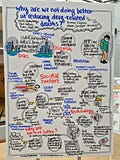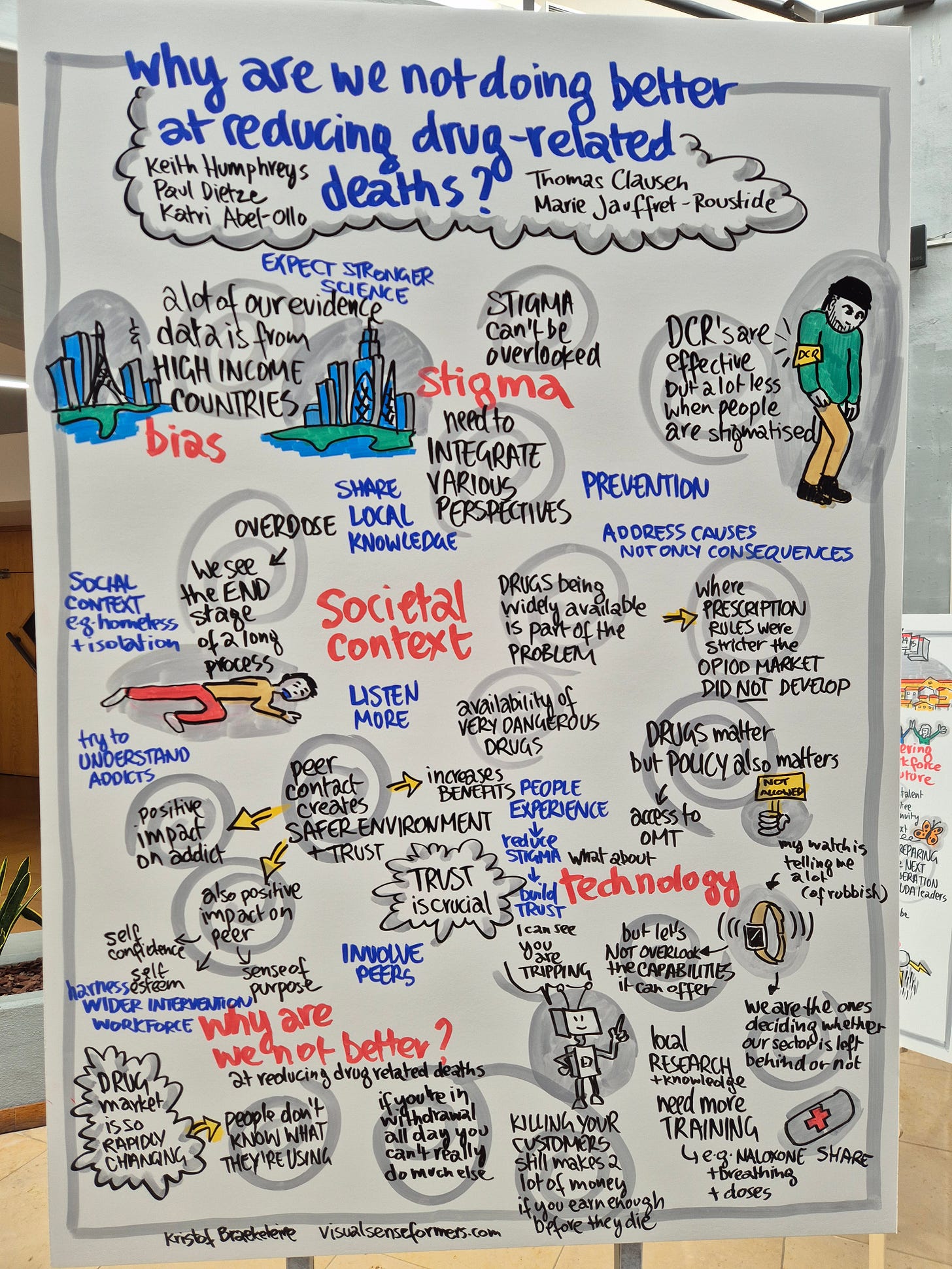It’s only been a few days since Whoopi Goldberg, Robert de Niro, and hordes of other entertainment-types rushed through town for the first Tribeca Lisbon festival. Some in the local press panned it as “an insult to cinema,” after movers-and-shakers filed into loud warehouses to watch puny screens on cheap folding chairs.
Downriver, in a less swanky area and in more modest accommodations, addictions experts gathered more recently for Lisbon Addictions 2024—technically the 5th European Conference on Addictive Behaviours and Dependencies, the largest European conference in the field. I love it. Here, there’s substance over style—more than 2,000 participants from 103 countries gather to focus on this important work.
This conference is not just multicultural but also interdisciplinary, in a way I rarely see in the U.S. There are presentations ranging from disorder classification, alcohol policy, workforce development, drug surveillance, infectious diseases, harm reduction, brain research, and more. In an often-siloed field, we need more of this kind of big-tent approach.
Of particular interest to me these days, the Europeans are much more involved in the study of behavioral addictions and problematic non-substance behaviors, especially when it comes to screens, gambling, and internet gaming, though us Yanks aren’t totally out to lunch here—the Yale researcher Marc Potenza gave a great plenary today.
The conference is just winding down now, and in the coming weeks I’ll share some extended thoughts, but for now, I wanted to dash off some preliminary notes while they’re fresh. In particular, three macro-level reflections have stuck with me in the past few days. I’d be curious for any of your thoughts and questions as I continue to turn them over, are I haven’t fully sketched out the connections.
Take-aways:
There is trouble on the horizon. Despite a slight recent downturn in the U.S.’s rate of overdose deaths, globally, synthetic drugs and novel psychoactive substances are a looming concern. Fentanyl is only the most obvious example of how novel synthetic drugs will be impossible to manage with our usual repertoire of supply-side controls. Consider: decentralized production methods, increased use of online markets, and weak regulation of precursor chemicals—not to mention simply higher potency. Similarly, we are seeing the explosive rise of gambling problems worldwide, not just because of powerful commercial gambling interests but also because of digital design technology that supercharges the risk and “stickiness” of gambling. These are just two ways that we must worry that addiction problems globally are going to get worse before they get better. And, as these problems develop, our old playbook will prove insufficient to meet the moment—for example, Adam Bisaga gave a great plenary about how medication treatment needs to evolve, as prior dosage levels for medications like buprenorphine are no longer sufficient to treat opioid use disorder.
These trends highlight how technology is increasingly supercharging addiction. Other examples include the rise of surveillance capitalism, the ongoing de-regulation and growth of on-demand alcohol delivery, and the growing penetrance of ultraprocesed food. The point is not that we are experiencing new addictions, but the addictions in all of us (read: the addictive processes and vulnerabilities that are part of our makeup) are being hypercharged. For example, we have had gambling for millennia—in The Urge, the first form of addiction I found in the historical record was a case of gambling addiction from at least 1000 B.C., in the Rig Veda—but today, digital profiling, targeted advertising, and massive deregulation (e.g., of U.S. sports betting), and other modern wrinkles make the activity much more prevalent and captivating—and dangerous.
Where this leads me is: our ability to respond to these challenges is significantly hampered by messy and outdated descriptions of the nature of addiction.
This last point is the one I keep turning over in my mind. There are many and complex relationships between conceptual issues on one hand and concrete issues of practice and policy on the other. I’m still thinking through how to outline this in a useful way. Here’s just one example:
Why and how do we regulate addictive products?
I’ve written quite a bit about how we have overpathologized addiction, in the sense of reating it like a biologically reductionist problem. This narrow view implies that addiction is something you “get,” and what’s more, something you get from an external substance. The drug is framed as a foreign invader that causes the problem. But addiction is more complex than that; it is a fundamentally human process shaped by psychological, social, and cultural factors.
At the level of regulation, we have traditionally labeled some products as “addictive,” and this has made sense and been useful. Consider tobacco in the 1980s, or oxycodone in the 1990s and 2000s. But by the same token, there is a risk of blindly following the same rubric for other products and getting bogged down in conceptual muddles about what qualifies as intrinsically addictive. For example, there are debates about social media today that hinge on what counts as “addictive.” But from a different perspective, commonsense regulation of potentially harmful products don’t necessarily need to be tethered to supposedly addictive qualities. We don’t need to predicate our regulation of products and devices on an extreme definition of addiction, in other words.
Now, I think there’s a danger of introducing more nuanced, “thicker” description of addiction—i.e., which describes it as a human process rather than an essence—and just complicating things in a way that is counterproductive. We still need to compete for the attention and resources of legislators and policymakers, after all. But if we oversimplify things, though, we run the risk of overclaiming and eroding our credibility.
In the end, this is just one example of how working toward conceptual clarity for addiction is truly impactful for real world practices. We need a way of describing addiction that captures its complexity while still supporting effective work in the world. The old paradigms are creaking under the strain of the drastic shifts through which we’re living. My hope for this newsletter is to play with ways of injecting the discourse around drugs and addiction with more nuance and complexity, so thanks for being here.




Thank you as always for all you bring back to share with us from the "front lines" (so to speak) of how these concepts take shape and inform perceptions. It's so greatly appreciated!
Are you still in Lisbon? I’m visiting here for a few more days.